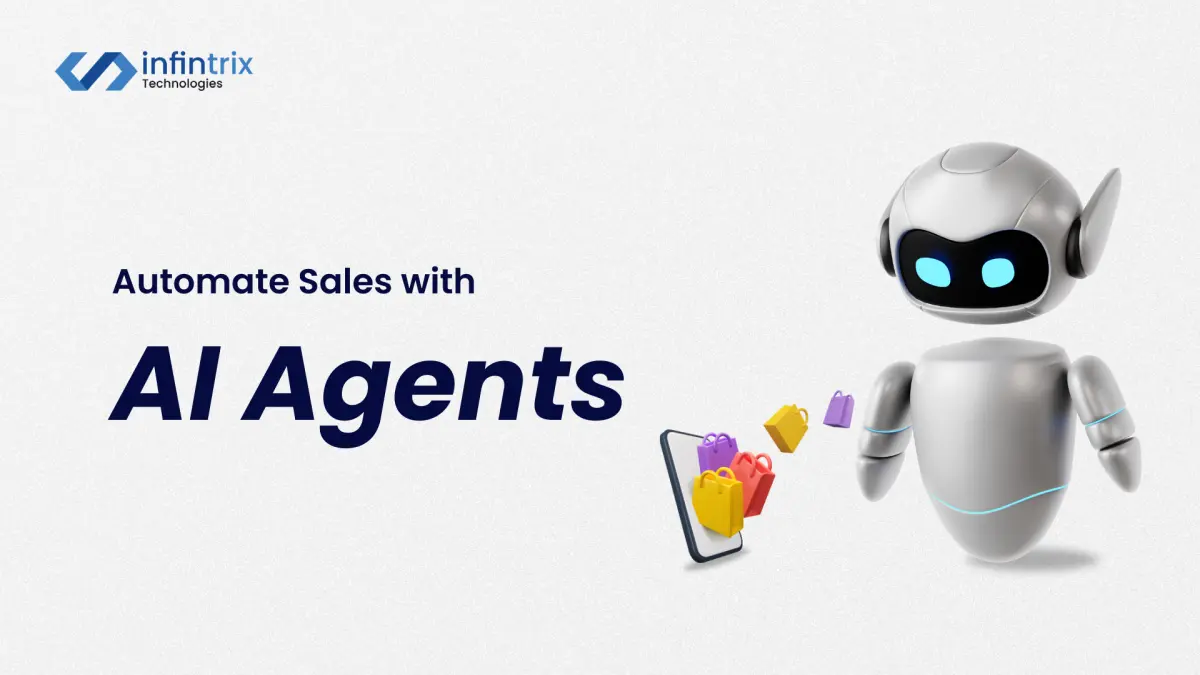In today’s rapidly evolving digital world, companies are always looking for new strategies to maintain a competitive edge. Enter AI agents—intelligent systems designed to revolutionize how we approach sales, customer engagement, and operational efficiency. But what exactly are AI agents for sales, and how can they transform your sales strategy? Whether you’re curious about intelligent agent in artificial intelligence examples or wondering how goal-based agents in AI can drive results, this blog is your ultimate guide.
Imagine having a virtual assistant that not only automates repetitive tasks but also provides actionable insights to close deals faster. Sounds like a game-changer, right? From types of AI agents with examples to real-world applications, we’ll explore how these tools are reshaping industries and why they’re no longer just a luxury but a necessity for growth. Ready to dive into the world of AI-powered sales? Let’s get started!
What Are AI Agents for Sales?
When you hear the term AI agents, what comes to mind? Perhaps futuristic robots or complex algorithms? While those aren’t entirely wrong, AI agents in sales are far more practical and accessible than you might think. Simply put, an AI agent is an intelligent system designed to perform specific tasks autonomously, using data and machine learning to make decisions. But how does this apply to sales? Let’s break it down.
Defining AI Agents in the Sales Context
AI agents in sales are software programs that automate and optimize various aspects of the sales process. From lead generation to customer follow-ups, these agents act as virtual assistants, helping sales teams work smarter, not harder. For example, a goal-based agent in AI might focus on achieving specific objectives, like increasing conversion rates or identifying high-value leads.
Key Features and Capabilities
What makes AI agents so powerful? Here are a few standout features:
- Automation: Handle repetitive tasks like data entry, email outreach, and appointment scheduling.
- Data Analysis: Analyze customer behavior and sales trends to provide actionable insights.
- Personalization: Tailor interactions based on customer preferences and past behavior.
How AI Agents Differ from Traditional Sales Tools
Unlike traditional tools, AI agents learn and adapt over time. They don’t just follow pre-set rules—they use machine learning to improve their performance. For instance, while a CRM system organizes data, an AI agent can predict which leads are most likely to convert, giving your team a competitive edge.
Real-World Applications
Curious about intelligent agent in artificial intelligence examples? Think of chatbots that handle customer inquiries 24/7 or predictive analytics tools that forecast sales trends. These are just a few ways AI agents are already making waves in the sales world.
By now, you might be wondering how these agents can fit into your own sales strategy. The good news? They’re more accessible than ever, and the benefits are undeniable. Ready to explore how AI agents can transform your sales process? Let’s dive deeper!
Benefits of Using AI Agents in Sales
Why should your business invest in AI agents for sales? The answer lies in the tangible benefits they bring to the table. From boosting efficiency to enhancing customer experiences, AI agents are reshaping the sales landscape. Let’s explore the key advantages.
Boosting Lead Generation and Conversion Rates
One of the most significant challenges in sales is identifying and converting high-quality leads. AI agents excel at this by analyzing vast amounts of data to pinpoint prospects most likely to convert. For example, a goal-based agent in AI can prioritize leads based on their likelihood to purchase, ensuring your team focuses on the right opportunities.
Enhancing Customer Personalization and Engagement
Today’s customers expect personalized experiences. AI agents make this possible by analyzing customer behavior and tailoring interactions accordingly. Whether it’s recommending products or sending personalized follow-up emails, these agents help build stronger relationships with your audience.
Reducing Operational Costs and Saving Time
Sales teams often spend hours on repetitive tasks like data entry and scheduling. AI agents automate these processes, freeing up your team to focus on high-value activities. This not only reduces costs but also increases overall productivity.
Real-World Impact
Consider this: companies using AI-powered sales tools have reported up to a 50% increase in leads and a 30% reduction in operational costs. These numbers speak for themselves—AI agents are not just a trend; they’re a necessity for staying competitive.
How AI Agents Transform the Sales Process
AI agents aren’t just tools—they’re game-changers. By integrating them into your sales process, you can unlock new levels of efficiency and effectiveness. Here’s how they’re transforming the way businesses sell.
Automating Repetitive Tasks and Workflows
From updating CRM records to sending follow-up emails, AI agents handle the mundane tasks that often bog down sales teams. This automation allows your team to focus on building relationships and closing deals.
Providing Data-Driven Insights and Predictions
AI agents analyze data in real-time, providing insights that help you make informed decisions. For instance, they can predict which leads are most likely to convert or identify trends in customer behavior. These insights empower your team to act strategically.
Improving Sales Team Collaboration and Efficiency
AI agents act as a bridge between different tools and platforms, ensuring seamless communication and collaboration. For example, they can integrate with your CRM, email marketing software, and analytics tools, creating a unified system that boosts efficiency.
Examples in Action
Looking for types of agent in artificial intelligence with example? Consider a chatbot that handles customer inquiries or a predictive analytics tool that forecasts sales trends. These are just a few examples of how AI agents are transforming the sales process.
Real-World Applications of AI Agents for Sales
Still wondering how AI agents can be applied in real-world scenarios? Let’s look at some practical examples that highlight their potential.
Case Study: AI Agents in E-Commerce Sales
E-commerce businesses are leveraging AI agents to personalize shopping experiences. For instance, AI-powered recommendation engines analyze customer behavior to suggest products, increasing average order values and customer satisfaction.
Case Study: B2B Sales Optimization with AI
In the B2B space, AI agents are used to identify high-value leads and automate outreach. For example, a goal-based agent in AI might analyze a company’s website traffic and social media activity to determine their likelihood of purchasing.
Emerging Trends in AI-Powered Sales Solutions
The future of AI in sales is bright. From voice-activated assistants to advanced predictive analytics, new innovations are constantly emerging. Staying ahead of these trends can give your business a significant competitive edge.
Implementing AI Agents in Your Sales Strategy
Ready to bring AI agents into your sales process? Here’s a step-by-step guide to help you get started.
Choosing the Right AI Sales Agent for Your Business
Not all AI agents are created equal. Start by identifying your specific needs—whether it’s lead generation, customer engagement, or data analysis—and choose a solution that aligns with your goals.
Integrating AI Agents with Existing Sales Tools
AI agents work best when integrated with your existing tools. Ensure compatibility with your CRM, email marketing software, and other platforms to create a seamless workflow.
Training Your Team to Work Alongside AI
Adopting AI agents requires a shift in mindset. Provide training to help your team understand how to use these tools effectively and embrace the changes they bring.
Overcoming Challenges and Pitfalls
While AI agents offer numerous benefits, they’re not without challenges. Here’s how to address common concerns and ensure a smooth implementation.
Addressing Data Privacy and Security Concerns
AI agents rely on data, which raises privacy and security issues. Ensure compliance with regulations like GDPR and implement robust security measures to protect sensitive information.
Overcoming Resistance to AI Adoption in Sales Teams
Change can be daunting. Address resistance by highlighting the benefits of AI agents and involving your team in the implementation process.
Ensuring Ethical and Transparent AI Practices
Transparency is key to building trust. Ensure your AI agents operate ethically and provide clear explanations for their decisions.
Conclusion
AI agents solutions are no longer a futuristic concept—they’re revolutionizing sales today. From automating repetitive tasks to delivering data-driven insights, these intelligent solutions enhance efficiency, boost conversions, and personalize customer interactions.
At Infintrix Technologies, we specialize in integrating AI-driven sales solutions tailored to your business needs. Our expertise ensures seamless implementation, helping you stay ahead in a competitive market.
Are you ready to transform your sales strategy with AI? Let’s unlock new levels of growth and efficiency together. The future of sales starts now!

